
Latest News Regarding
Horn of Africa
Sudan: Talks Resume between Military and Civilian Faction
Sudan: Talks Resume between Military and Civilian Faction
Source: Al-Monitor published on 16 June 2022 an article titled “US, Saudi Arabia Broker Talks to Break Sudan’s Coup Deadlock” by Marc Espanol.
Sudan’s military and one civilian faction met on 10 June for talks designed to break the deadlock on transitioning Sudan to civilian government. The United States and Saudi Arabia brokered the talks, which are ongoing. The gap remains wide between the two sides (actually three sides as an important civilian faction is boycotting the talks).
Labels: AU, coup d’etat, democracy, Forces for Freedom and Change, IGAD, mediation, military, Mohamed Hamdan Dagalo, Molly Phee, Saudi Arabia, Sudan, Sudanese Professionals Association, UN, UNITAMS, US
Is Al-Shabaab Ready for Dialogue?
Is Al-Shabaab Ready for Dialogue?
Source: The International Crisis Group (ICG) published on 21 June 2022 a commentary titled “Considering Political Engagement with Al-Shabaab in Somalia.”
The International Crisis Group, acknowledging the failure of past efforts, argues that now is the time for Somalia’s new government to look into what room there might be for dialogue with al-Shabaab.
Comment: While political dialogue is usually a positive step, especially when juxtaposed against long-standing and seemingly endless conflict, the evidence that al-Shabaab is ready for meaningful dialogue with the government of Somalia is exceedingly weak. Al-Shabaab seems interested in dialogue only if it results in 100 percent control of Somalia (and perhaps surrounding regions) by al-Shabaab.
Labels: al-Qaeda, al-Shabaab, AMISOM, AU, Ethiopia, Hassan Sheikh Mohamud, Kenya, Somalia, US
World Refugee Day: Meet the Somali politicians breaking through in the Nordics
World Refugee Day: Meet the Somali politicians breaking through in the Nordics

Source: euronews, By David Mac Dougall
Tuesday June 21, 2022
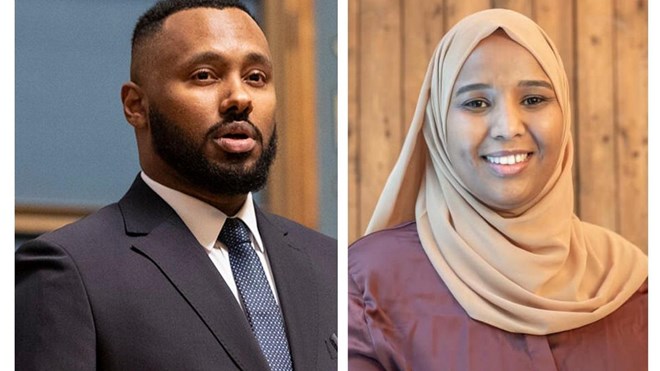
Composite image showing Suldaan Said Ahmed and Marian Hussein – Copyright Euronews
To mark World Refugee Day, Euronews profiles two Somalis and traces their journeys from arrival in the Nordics to their breakthroughs as politicians.
_In the Nordic region, the first Somalis arrived in the late 1980s and early 1990s. Later, as Somalia’s civil war became more intense, new arrivals came.
Now, the first generation of Somali refugees is making their mark in politics, from local council level to the national stage.advertisements‘Many challenges in small cities for immigrants’
Suldaan Said Ahmed is Finland’s first member of parliament with a Somali background. His family came to the Nordic nation as refugees on family unification visas when he was a teenager, to join his brother who was already living there.
At that time Finnish authorities had a policy to place refugees in different parts of the country, rather than concentrating them all in bigger cities, so Suldaan and his family went to live in North Karelia, a region in the northeast of Finland along the Russian border.
“It was a good time to live in North Karelia, to learn the language, start school and adapt to Finnish culture. But there are also many challenges in small cities especially when you have an immigrant background,” said 29-year-old Suldaan.
“Big cities always have more job opportunities, they are more tolerant. These smaller cities, since they don’t have a big number of immigrants, there is a lot of challenges,” he tells Euronews.
North Karelia’s main city, Joensuu, had earned itself a reputation as a dangerous place for immigrants in the early 1990s with violent attacks by skinheads a particularly nasty problem, prompting a great deal of concern for Suldaan’s mother who wanted to move the family to London.
“We got together and said ‘mum, since childhood we have been moving from place to place, and every time we have to start to adapt to a new language and new culture. But we understand that you feel loneliness as a single mother with no other Somali people and no other African people. So maybe we make a compromise and move to Helsinki where there is a bigger diaspora?'”
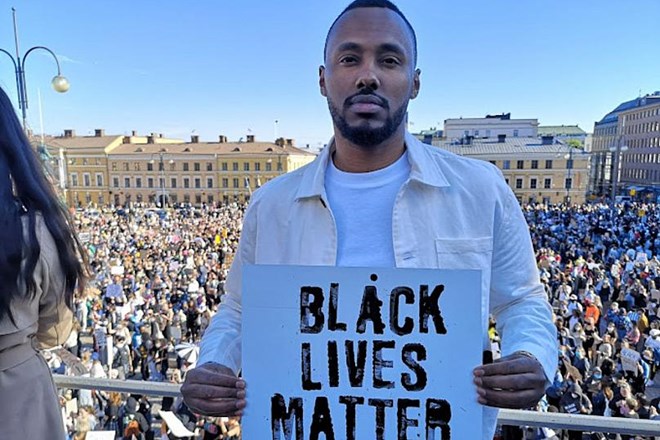
Suldaan Said Ahmed attends a Black Live Matter rally in Helsinki, June 2020David Mac Dougall
Suldaan’s political activism started only after the family moved to Helsinki, and he saw the breakthrough of the right-wing True Finns Party in the 2011 election.
This, he decided, was a wake-up call to stand up against racism and xenophobia, and he reached out to the Left Alliance political party asking to become a candidate before the next local council elections.
The first election didn’t go his way, and he didn’t get enough votes for a seat on the Helsinki City Council, but he persevered.
“When I saw that I am not getting elected I was disappointed. But I also decided I am a young man, I just moved here to Helsinki from North Karelia and 91 people decided I am the best person to take care of their interests. I said ‘Suldaan, this is a good start!'”
Fast forward to the next local elections in 2017 and by this time Suldaan had joined the Left Alliance, and already had a leadership position within the party’s management. When the votes were counted, he was elected to the city council with more votes than veteran campaigner Paavo Väyrynen – one of Finland’s most well-known politicians.
At the 2021 Finnish general election, Suldaan wasn’t voted directly to parliament, but within the party list system he replaced another Left Alliance politician to become the first Somali to sit in Finland’s parliament, representing Helsinki.
“Any time I get hate speech or a hateful message, and if I quit, these people win. Always someone who comes first makes a sacrifice and now young people from an immigrant background or different minority background at least they have some people they can call a role model.”
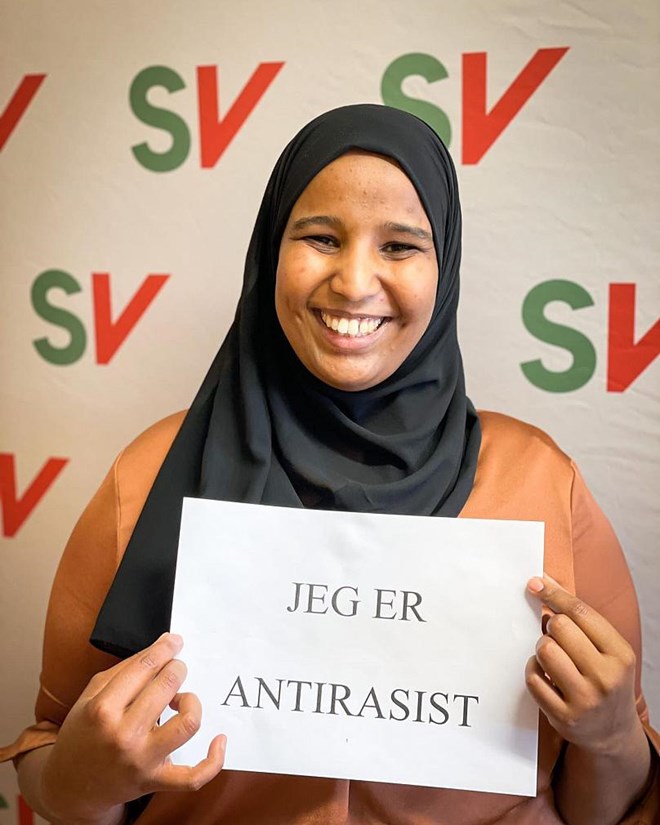
Norwegian MP Marian Hussein holds anti-racist sign, March 2022Marian Hussein
From social worker to politician
In Norway, Marian Hussein wasn’t only the first elected MP with a Somali background, she was the very first person of African descent to take up a seat in parliament in Oslo.
Her family moved from Saudi Arabia, where her father had been a migrant worker, when Marian was 10-years- old, and at first the new home shocked her.
“You come from one of the hottest areas of the world to one of the coldest. We came during winter time with snow, and we were not in the city but in a district close to Lillehammer, where they had the Winter Olympics,” Hussein,36, told Euronews.
One of the most eye-opening things for young Marian was the Norwegian education system, where boys and girls were allowed to attend public school – in their previous home only Saudi nationals had any rights to go to public schools while migrant worker families were banned.
Marian came into politics quite late, after she had already completed her education and been working as a social worker.
“I was engaged in different activities, but I never saw myself being in the political arena,” she said.
And like Suldaan, it was the election of right-wing politicians into government that made her consider getting more involved in politics at a national level.
“In 2013 in Norway, the Conservative Party took over and they started ruling with the (right-wing) Progress Party, and in that night I joined the Socialist Left Party,” she said.
There was still a great deal of uncertainty for Marian about how involved she should get, especially dealing with the idea that she didn’t know enough about politics, or lacked experience to join a TV debate.
But she had some role models she looked up to, like Palestinian politician Hanan Ashrawi.
“So I knew about women in politics, but I never thought I would be one!”
“It took me time to understand how much impact that I have, but it’s so important that in the last 20 years there has been a debate on how little integrated refugees are in Norwegian society to participating in debates where people are debating our history and our lives”
“It is so important to be in these discussions and tell them what is working and what is not working and how people live their lives and don’t let people who use fear as a political agenda.”
World Bank earmarks $385m to help Africans in “worst in a century” drought
World Bank earmarks $385m to help Africans in “worst in a century” drought
Friday June 17, 2022
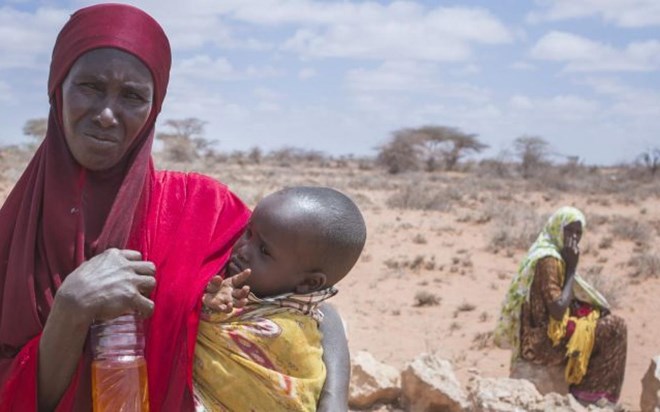
The World Bank has approved a $385m finance package to help countries in the Horn of Africa deal with water insecurity.
Three consecutive rainy seasons have failed, and this year’s looks set to follow suit. If it does, the region will face its worst drought in 100 years.
advertisementsMore than 1 million grazing animals have died in Ethiopia’s Somali region alone, millions of children are suffering from malnourishment and, in Somalia, it is estimated that 40% of the population are at risk of starvation.
The funding, thought to be a mix of grants and low- or no-interest loans, will be spent on a groundwater exploitation project, including well-digging and groundwater pumping, carried out with the Intergovernmental Authority on Development (IGAD), an eight-country trade and cooperation bloc covering the Horn of Africa, the Nile Valley and the African Great Lakes.
In an IGAD meeting in May, Workneh Gebeyehu, its executive secretary, said some 40 million people were facing high levels of food insecurity, “an increase of 30% from the 29 million that had been recorded at the beginning of April”.
The project will bring together the governments of Ethiopia, Kenya and Somalia. Djibouti and South Sudan have expressed interest in joining in later phases.
The aim of the “Horn of Africa Groundwater Resilience Project” is to exploit the region’s “largely untapped groundwater resources”, said the World Bank.
It will assess the state of the region’s aquifers, dig wells and set up small-scale solar farms to pump water for people and livestock. The first phase is expected to have 3.3 million direct beneficiaries, of whom at least half will be women.
The programme will also construct small-scale irrigation systems with the aim of preventing soil erosion, and will build sand dams in dry riverbeds. These help to retain soil moisture and concentrate water during dry months.
Daher Elmi Housssein, IGAD’s director of agriculture, commented in a press statement: “Groundwater constitutes a natural buffer against climate variability and change, as it is available in times of drought when other surface or subsurface resources are scarce.
“The potential is vast, and we are committed to building inclusive community-level use of this shared resource, along with better information, infrastructure, and institutions to ensure our groundwater is sustainably managed for generations to come.”
Afrik 21 reports that one of the first schemes will take place in the Borena region of Ethiopia, on the border with Kenya. This will help farmers in the lowlands to switch from rain-fed to groundwater-based agriculture. Irrigation systems will also be equipped with pressurised systems that use renewable energy to pump and distribute the water
BREAKING: President Hassan Sheikh nominates Hamza Abdi Barre as PM
BREAKING: President Hassan Sheikh nominates Hamza Abdi Barre as PM

Source: Hiiraan online, Wednesday June 15, 2022
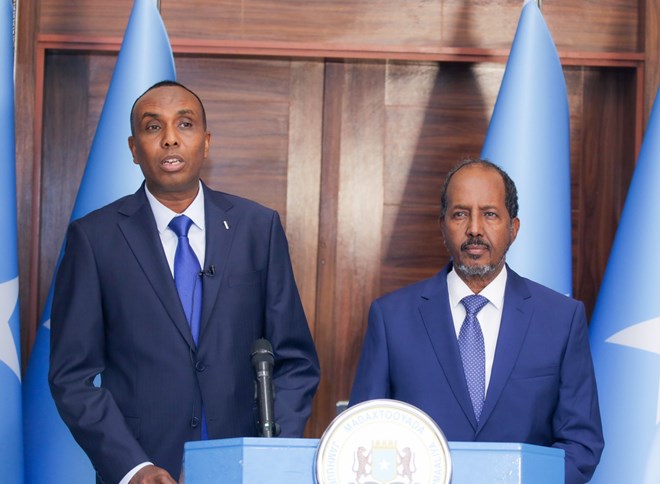
Mogadishu (HOL) – Somali President Hassan Sheikh Mohamud has nominated Hamza Abdi Barre as Somalia’s next Prime Minister, according to state-run media.
advertisementsMohamud called on Somalis to support Barre.
“The President wishes the new PM utmost success as he leads the government’s ambitious reform agenda and calls on Somali people to render him their unwavering support.”
Barre’s most recent political appointment was the Chairperson of Jubaland’s Independent Boundaries and Electoral Commission from 2019 to 2020.
Barre is also an MP in Somalia’s 11th Parliament. He was elected to HOP203 in late Decemeber 2021.
At the federal level, he worked as a senior advisor to the Ministry of Constitutional Affairs and has been described by colleagues as a staunch federalist.
The 48-year-old father of eight is a close associate of President Mohamud. He served as the Peace and Development Party Secretary-General from the early to mid-2010s.
The new Prime Minister hails from the Ogaden subclan. He is also reportedly a close political ally of Jubaland regional President Ahmed Mohamed Madobe.
The new Prime Minister holds an MBA in management from the International Islamic University of Malaysia.
President Mohamud’s nomination must be approved by Somalia’s parliament before it is official.
South Sudan, Peace Deals, and Corruption
South Sudan, Peace Deals, and Corruption
Source: Just Security published on 13 June 2022 a commentary titled “South Sudan: The Road to a Living Hell, Paved with Peace Deals” by James P. McGovern, Member of Congress, and John Prendergast, senior advisor to the Clooney Foundation for Justice.
The warring parties in South Sudan have signed numerous peace deals since 2014 to little positive effect. Corruption has become the hallmark of South Sudan and the relationship between the president and vice president remains volatile and full of mutual suspicion.
Labels: corruption, EU, human rights, kleptocracy, peace talks, refugees, Riek Machar, Salva Kiir, sanctions, South Sudan, UK, US, war crimes
Spanish, French fleets blacklisted from Indian Ocean for illegal fishing
Spanish, French fleets blacklisted from Indian Ocean for illegal fishing

Source: TheEastAfrican, By ANTHONY KITIMO
Wednesday June 15, 2022
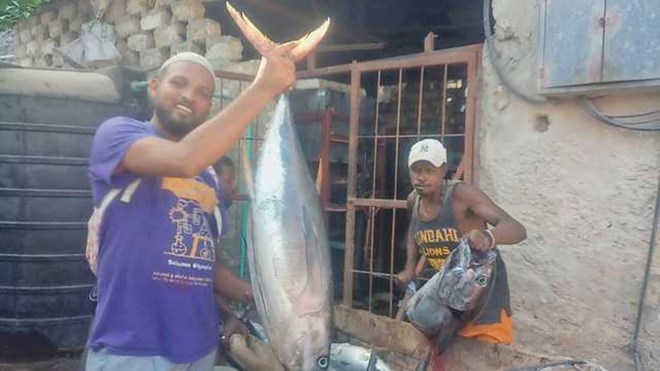
A fisherman in Lamu County, Kenya, displays the much sought-after Tuna fish. FILE PHOTO | NMG
Spanish and French vessels found fishing illegally in the Indian Ocean have been blacklisted after a key watchdog found them repeat offenders.
The Indian Ocean Tuna Commission (IOTC) says the vessels were found to have been illegally fishing in the exclusive economic zones of Somalia, Mauritius, India and Mozambique; without the respective permission of these countries. A situational report by IOTC, released during the 26th Session in Seychelles says: “Fleets such as these cause irreversible damage to our ocean, threatening marine life and the people who depend on it around the world.
“This was recognised by nations at the IOTC meeting this week, where the several member countries urged the Commission to blacklist the fleet. They catch more yellowfin tuna than any other gear in the Indian Ocean – with 97 percent of the yellowfin tuna caught around dFADs in the Indian Ocean by purse seiners being juveniles,” the statement said.
Kenya and South Africa’s aggressive hunt against drifting fish aggregating devices (dFADs), such as trawlers, contributed to the decision. Conservationists are increasingly contesting the use of such fishing techniques as the vessels catch more juvenile fish that could contribute to the dissipation of species.
IOTC, an intergovernmental organisation mandated to guard highly migratory tuna and tuna-like fisheries resources in the Indian Ocean has also been promoting the use of appropriate fishing techniques. The Commission did not name the number of vessels banned but did suggest all those carrying flags from the two countries will no longer be permitted to fish in the zone.
The Indian Ocean is the second-largest tuna fishery in the world.
US Military Support for Somalia
US Military Support for Somalia
Source: The Conversation published on 29 May 2022 a commentary titled “US Will Soon Redeploy Troops in Somalia: The Mission and Key Goals” by Paul D. Williams, George Washington University.
The US goal in Somalia is to stabilize the country, contain and weaken al-Shabaab, and build an effective set of State institutions. The recent decision by the Biden administration to return about 450 US soldiers to Somalia is intended to support that goal.
Labels: al-Shabaab, ATMIS, AU, Biden administration, Danab, governance, SNA, Somalia, US
110th ILO World of Work conference discusses labour during multiple global crises
110th ILO World of Work conference discusses labour during multiple global crises

Source: hiiraan.comMonday June 13, 2022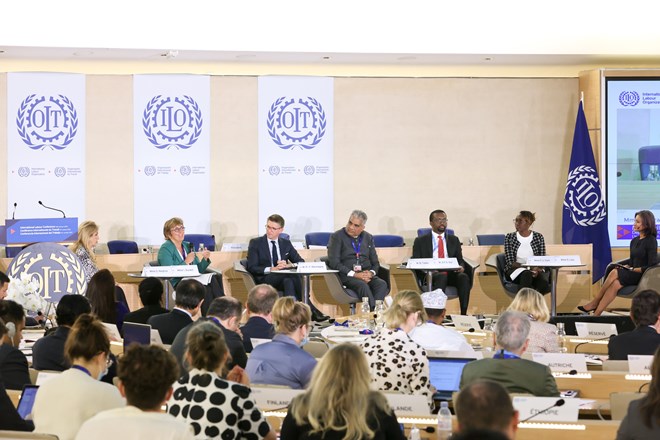
Geneva (HOL) – The 110th International Labour Conference (ILC) concluded this weekend in Geneva, Switzerland.
The ILC is the highest decision-making body of the International Labour Organization and is held annually to advance the core mandate of the organization.
More than 4,000 delegates representing governments, workers’ and employers’ Organizations from 177 ILO Member States attended the 110th ILC.
advertisementsThis year’s theme was tackling multiple global crises and promoting human-centred recovery and resilience.
Omar Faruk Osman Nur, the General Secretary of the Federation of Somali Trade Unions, delivered to the delegates in the historic Palais des Nations where he discussed Somalia’s unique set of challenges which have impacted its economic, social and political development.
“In 2019, the World Bank found that almost 9 out of 10 Somali households were deprived of at least one basic human need – money, electricity, education, water, and sanitation. Children under the age of 14 years represent nearly half of the Somali population, and 73% of these children are trapped in the vicious cycle of poverty. Because of decades of devastating conflict, civic institutions remain weak; peace and security remain fragile amid the pervasive threats of terrorism attacks, and media freedom is still some way off track.”
Osman also explained how the COVID pandemic disrupted the labour market.
“In Somalia, one year into the crisis, employment had contracted by 37%, with medium-size, large, and older firms shedding most of the jobs.”
Over half of the working-age population aged 15–64 (55%) are primarily employed in the informal economy. Only 43% of Somali women are actively engaged in the labour market compared with 67% of men. Osman added that workers have no formal and government-led social protection programme.
Osman revealed the results of a study conducted by FESTU with technical assistance from the ILO that found that most workers were concerned about their employers’ lack of consideration for the health dangers posed by COVD-19. They surveyed 1927 workers, 448 of whom were women.
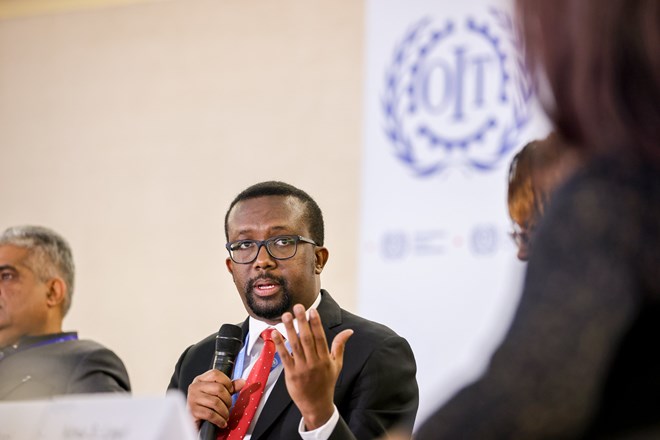
Omar Faruk Osman Nur, the General Secretary of the Federation of Somali Trade Unions
“FESTU found that because of the COVID-19 pandemic, employers were reducing working hours and wages with little or no consultation with employees and/or union representatives. COVID–19 also leads to an overrepresentation of women in the informal economy or in precarious jobs, which directly impacts the health and wellbeing of household members.”
Osman said that international labour rights have begun to take form in Somalia through legislation and policy.
He called on the federal government and member states to adopt and implement Somalia’s Decent Work Country Programme, which emphasizes decent employment, workers’ rights, social protection and social dialogue.
The Director-General of the International Labour Organisation, Guy Ryder, said the 110th International Labour Conference closes with a “remarkable harvest of achievements.”
The Director-General told delegates that the 110th International Labour Conference had made history with its work on safety and health, apprenticeships, and labour standards, among other areas.
Ryder said the Committee on the Application of Standards was crucial to the UN’s capacity to help those affected by human rights violations.
“During this conference, I have received alarming, even harrowing testimony of the situation of people whose lives, livelihoods and liberty are in the balance, and it is in the Standards Committee that our capacity to come to their assistance resides.”
The 110th ILC was the first Conference since 2019 that delegates were able to attend in person because of the COVID-19 pandemic.
The 111th Session of the ILC is scheduled to take place from 5 to 16 June 2023.
Secret negotiation between Abiy Ahmed’s gov’t and TPLF to take place in Tanzania : report 16 Shares

Source: borkena.comMonday June 13, 2022
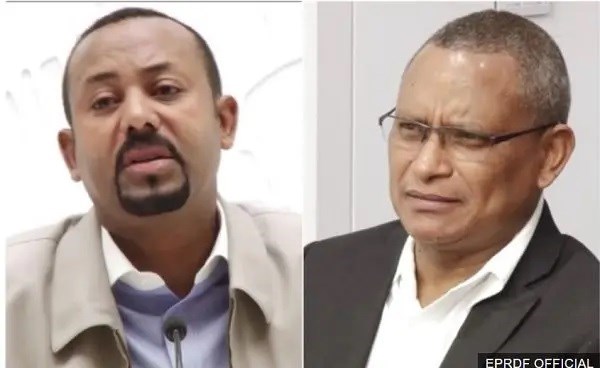
PM Abiy (left) and Debretion Gebremichal, TPLF chairman ( right) ( Photo : File)
Weeks after unconfirmed news regarding secret negotiation between Prime Minister Abiy Ahmed’s government and the Tigray People’s Liberation Front (TPLF) in Nigeria, a new report indicates that the talk between the two parties is going to take place in Tanzania.
Le Monde, a French News source, said, in a report published on Thursday, “behind the scenes” negotiation is organised between the Federal government and TPLF forces. It is planned to take place at the end of June in Arusha, Tanzania.advertisementsThe source cited “several African and western diplomats” to report that the discussion could start by the end of this month.
The negotiation is said to be behind doors and both parties will be represented by a team of five negotiators. The negotiation aims, a negotiated ceasefire.
Humanitarian deliveries and resumption of social services in the Tigray region, including electricity and banking, among other things, constitute agenda items for the talk.
According to Le Monde, TPLF is to renounce claim over Wolkait area of Gondar which is used to call as “Western Tigray.” Le Monde cited unnamed diplomatic sources in Addis Ababa to report that “the Tigrayan leadership gives the impression of gradually abandoning its claims to Wolqayt.”
The TPLF, however, says that the report is “mendacious.”
In a message shared on social media, Getachew Reda, TPLF spokesperson, said :
“An article by a French newspaper #LeMonde apparently claims, quoting unnamed Addis-based diplomats, that discreet talks will be held b/n Tigray and Ethiopian authorities and the former has “abandoned their claims to Western Tigray”. These are mendacious claims,of course. While we will officially address these claims soon, let me set the record straight on the question: it is the declared intention& position of the government of Tigray to reclaim every square-inch of Tigray’s territory by every possible means available- peaceful or otherwise; and soon!”
Earlier this week, press secretary in the office of the Prime Minister, Billene Seyoum, described reports of unconfirmed clandestine talk between Abiy Ahmed’s government and the TPLF as “disinformation by local media.”
However, former Nigerian President Olusegun Obasanjo, who is now serving the African Union as special envoy to the Horn of Africa, said there have been improvements in the indirect talks between the TPLF and Prime Minister Abiy Ahmed’s government. Mr. Obasanjo said that the talk is now better than what it was six months ago.
When Ethiopia’s Minister for Finance, Ahmed Shede, presented a draft budget for the next fiscal year at the Ethiopian Parliament, he said that one of the assumptions taken into consideration when preparing the budget is that there will be no war in northern Ethiopia. The Tigray region itself will be getting 12 billion Ethiopian birr from the budget.
Since the TPLF is firmly administering the region, despite the fact that the Ethiopian parliament designated it as a terrorist organization, it will be administering the budget to be released from the Federal government.
State Formation in Somalia
State Formation in Somalia
Source: The Royal United Services Institute published on 10 June 2022 an analysis titled “Ballots, Bullets and Building Blocks: State Formation in Somalia” by Michael Jones.
The author concluded that the recent election and change of leadership has shifted Somalia from acute to chronic crisis, but in doing so it has at least helped strengthen the normative tissue necessary for reform.
Labels: al-Shabaab, corruption, drought, elections, federation, foreign aid, Hassan Sheikh Mohamud, HIPC, Somalia
PM Abiy in Djibouti for official work visit
PM Abiy in Djibouti for official work visit

Source: Ethiopian News Agency, Saturday June 11, 2022
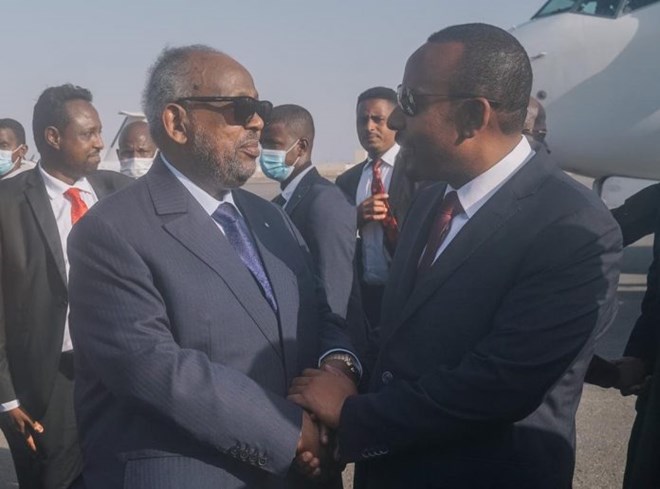
Prime Minister Abiy Ahmed has arrived in Djibouti for an official work visit.
Premier proceeded to Djibouti after attending the inauguration ceremony of the newly elected president of Somalia, according to Ethiopian Embassy in Djibouti.advertisementsSpeaking at the inauguration ceremony of the newly elected Somalia’s President Hassan Sheikh Mohamud in Mogadishu on Thursday, the PM said “I express and reiterate the commitment of the Government of Ethiopia to the people and Government of Somalia at large.”
He stated that the government of Ethiopia is committed to work together with Somalia in a more robust relationship to achieve a better future for the people and to determine mutual destiny together.
Challenges Facing Somalia
Challenges Facing Somalia
Source: The US Institute of Peace published on 1 June 2022 an analysis titled “Somalia’s Critical Transition Comes Amid Al-Shabaab and Hunger Challenges” by Susan Stigant.
The author comments on the major challenges facing new Somali President Hassan Sheikh Mohamud, including security, debt relief, drought, and the al-Shabaab threat.
Labels: al-Shabaab, ATMIS, climate change, debt relief, drought, food insecurity, Hassan Sheikh Mohamud, IGAD, security, Somalia, US
Issues Facing the New US Special Envoy for the Horn of Africa
Issues Facing the New US Special Envoy for the Horn of Africa
Source: The Middle East Institute published on 6 June 2022 my short note titled “A New US Special Envoy for the Horn of Africa.“
It briefly covers the challenges of conflict and the humanitarian crisis in Ethiopia, the democratic transition in Sudan, the al-Shabaab threat in Somalia, and disagreement over Nile water usage following construction of the Grand Ethiopian Renaissance Dam on the Blue Nile.
Labels: al-Shabaab, Egypt, Eritrea, Ethiopia, GERD, Horn of Africa, humanitarian crisis, Mike Hammer, Nile water, Somalia, Sudan, US
Talks to end Sudan crisis begin as anti-coup groups boycott
Talks to end Sudan crisis begin as anti-coup groups boycott
Source: AP, By SAMY MAGD, Yyesterday, 08 June 2022

1 of 5Sudanese men burn tires during a demonstration to commemorate the third anniversary of a deadly crackdown carried out by security forces on protesters during a sit-in outside the army headquarters, in Khartoum, Sudan, Friday, June 3, 2022. Talks aiming at ending Sudan’s ongoing political deadlock began Wednesday, June 8, 2022, the United Nations said, although the country’s main pro-democracy alliance is boycotting them over a continued police crackdown on those protesting last October’s military coup. (AP Photo/ Marwan Ali)
CAIRO (AP) — Talks aiming at ending Sudan’s ongoing political deadlock began Wednesday, the United Nations said, although the country’s main pro-democracy alliance is boycotting them over a continued police crackdown on those protesting last October’s military coup.
The joint peace effort is brokered by the U.N. political mission in Sudan, the African Union, and the eight-nation east African regional group Intergovernmental Authority in Development. The effort aims to bring the generals and an array of political and protest groups to the negotiating table.
The military’s takeover has upended Sudan’s short-lived fragile democratic transition and plunged the East African nation into turmoil. Sudan had been transiting to democracy after nearly three decades of repression and international isolation under Islamist-backed strongman Omar al-Bashir. A popular uprising pushed the military to remove al-Bashir in April 2019.ADVERTISEMENT
Wednesday’s talks began with a technical meeting in Khartoum, the Sudanese capital, involving the military and civilians. It came after months of separate discussions with an array of groups, including the military and the pro-democracy movement.
The U.N. envoy for Sudan, Volker Perthes, said the process would discuss a “transitional program,” including the appointment of a civilian prime minister and arrangements for drafting a permeant constitution and elections at the end of the transition.POLITICSNew vaccine may be option for troops with religious concerns4th grade Uvalde survivor: ‘I don’t want it to happen again’Capitol attack’s full story: Jan. 6 panel probes US risksBiden lauds democratic unity despite no-shows at summit
Gen. Abdel-Fattah Burhan, the leader of the coup who also heads the ruling sovereign council, welcomed the talks as a “historic opportunity to complete the transitional phase.”
In a speech to the nation late Tuesday, he urged all factions to take part in the talks, vowing that the military will implement their outcome. “We are fully committed to work with everybody to end the transitional period as soon as possible with fair and transparent elections,” he said.
Ahead of the talks, U.S. Assistant Secretary of State for African Affairs Molly Phee visited Sudan earlier this week and met with military and civilian leaders in Khartoum to support the negotiating process. She urged all parties to join the talks to “achieve a civilian-led path towards democracy for Sudan.”
However, the Forces for the Declaration of Freedom and Change — an alliance of political parties and protest groups — is boycotting the meeting, in a blow to the process.
The alliance says the talks should lead to “a civilian democratic authority” and criticized the participation of pro-military groups and Islamists who had been allied with al-Bashir’s government. It also seeks the the release of coup-related detainees, and the ending of violence against protesters.
Two activists said the U.N., the United States and other Western governments were pressuring the pro-democracy alliance to send representatives to the talks.
Some factions within the alliance favor participation as “the best possible option,” given the international support for the talks, they said, but hard-liners, including the influential Communist Party, reject the entire process and demand immediate handover of power to civilians. The activists spoke on condition of anonymity to discuss internal deliberations.ADVERTISEMENT
The talks come as the violent crackdown on anti-coup protests continued in Khartoum. A 5-year-old girl was killed Tuesday, when a police vehicle ran her over while chasing protesters. That brought the total deaths among protesters since October to at least 101, according to a medical group tracking the casualties.
The coup has triggered near-daily street protests, which authorities have met with a deadly crackdown. Hundreds of people, including prominent politicians and activists, have been detained, although many have been released recently as part of trust-building measures.
Under concerted international pressure, Sudan’s military leaders late last month lifted the state of emergency they had declared following the coup.
Spain seizes record haul of ‘synthetic khat’ narcotic

Source: AFP, Thursday June 9, 2022

In this handout image released by Guardia Civil on January 9, 2022 a helicopter used to smuggle drugs is loaded on a truck by police after being seized in Torremolinos, Spain. (AFP)
Spain’s Guardia Civil police said Wednesday they had made Europe’s biggest seizure of substances derived from the khat plant, confiscating more than 3.2 tonnes of synthetic cathinones at Barcelona port.
The product is a derivative of a stimulant found in the leaves of the khat plant, which is native to the Horn of Africa and the Arabian Peninsula.advertisements“The Guardia Civil has seized the biggest quantity of synthetic cathinones found in Europe to date,” a police statement said.
“They seized a total of 3.2 tonnes of this substance, which on the market would fetch 61 million euros ($65 million),” it added.
Images released by the police showed dozens of blue plastic drums used to transport the crystal-like substance, which commonly goes by the name “bath salts.”
Khat, or qat, is a mildly narcotic leaf which is packed into the cheek and slowly chewed, releasing chemicals similar to amphetamines and resulting in a mild high.
It is very popular in Yemen and Horn of Africa countries like Ethiopia and Somalia.
Its synthetic variants, however, are “more potent than the natural compound and much more dangerous,” the Guardia Civil warned.
The investigation began at the start of the year after an operation in France uncovered a possible storage location at Barcelona port, where the drugs were shipped out to other countries in Europe.
By falsifying customs certificates and working through three companies, the international ring running the operation was able to move a large quantity of the product, police said.
World Bank Provides $385 Million to Horn of Africa Countries to Tap Groundwater Potential and Boost Climate Resilience
World Bank Provides $385 Million to Horn of Africa Countries to Tap Groundwater Potential and Boost Climate Resilience
Source: World Bank Group
Thursday June 9, 2022
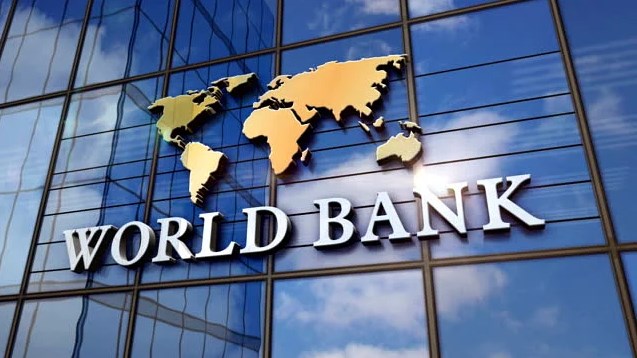
WASHINGTON, June 8, 2022—The World Bank’s Board of Executive Directors approved the Horn of Africa Ground Water for Resilience Project (HoAGWRP), a new multi-phase project benefitting from $385 million in International Development Association (IDA*) financing that will boost the region’s capacity to adapt to the impacts of climate change.
The project fosters cooperation with Ethiopia, Kenya, Somalia, and the Intergovernmental Authority on Development (IGAD), who will work together to tap into the region’s largely untapped groundwater resources to cope with and adapt to drought and other climate stressors impacting their vulnerable borderlands. Djibouti and South Sudan have also expressed interest in joining the program in subsequent phases.advertisements“Groundwater constitutes a natural buffer against climate variability and change, as it is available in times of drought when other surface or subsurface resources are scarce,” said Daher Elmi Housssein, IGAD’s Director of Agriculture and Environment Division. “The potential is vast, and we are committed to building inclusive community-level use of this shared resource, along with better information, infrastructure, and institutions to ensure our groundwater is sustainably managed for generations to come.”
This first phase of the HoA Groundwater for Resilience Program (GW4R) is estimated to reach 3.3 million direct beneficiaries, of whom at least 50 percent are women, through interventions designed to increase access to water supply and reduce vulnerability to climate change impacts. It will also contribute to improving food security in a region undergoing a severe drought. Project beneficiaries also include institutions responsible for groundwater management, including line ministries, government agencies, national authorities, and agencies at the national and sub-national levels.
In the short term, the project will establish the building blocks that will enable the medium and long-term agenda of improving transboundary water management in the Horn of Africa. IGAD will play a central role as the main promoter and facilitator of the long-term regional strategy, including data and information sharing. First-phase activities will include constructing medium and small-scale infrastructure to provide sustainable access to groundwater resources in the borderlands, developing information and knowledge on regional aquifers, and building institutional capacity on groundwater management and governance.
“World Bank experience shows that gaining knowledge on aquifers, building trust around shared groundwater resources, and jointly developing groundwater management mechanisms among countries involve a long-term trajectory that needs to be approached gradually. The role of a regional institution is key to achieving synergies, sustainability, and economies of scale,” said Boutheina Guermazi, World Bank Director for Regional Integration for Sub-Saharan Africa, the Middle East and Northern Africa.
Adopting a robust approach to monitoring and learning is critical throughout the stages mentioned above, to ensure incremental and enhanced institutional capacity, trust and collaboration. Program outcomes will be further strengthened through the support of the Cooperation in International Waters in Africa (CIWA) Program, aimed at enhancing the HoA’s institutional capacity and knowledge base on sustainable groundwater management in the borderlands.
*The World Bank’s International Development Association (IDA), established in 1960, helps the world’s poorest countries by providing grants and low to zero-interest loans for projects and programs that boost economic growth, reduce poverty, and improve poor people’s lives. IDA is one of the largest sources of assistance for the world’s 74 poorest countries, 39 of which are in Africa. Resources from IDA bring positive change to the 1.3 billion people who live in IDA countries. Since 1960, IDA has provided $458 billion to 114 countries. Annual commitments have averaged about $29 billion over the last three years (FY19-FY21), with about 70 percent going to Africa. Learn more online: IDA.worldbank.org. #IDAworks
Presidents of Kenya, Djibouti, Ethiopian PM arrive in Mogadishu
Presidents of Kenya, Djibouti, Ethiopian PM arrive in Mogadishu

Source: Hiiraan online, Thursday June 9, 2022
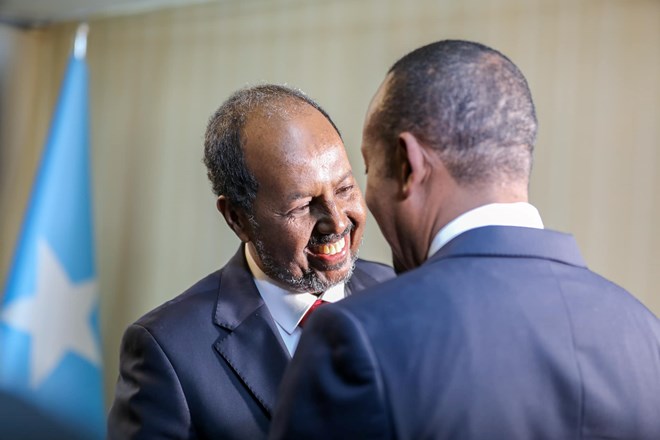
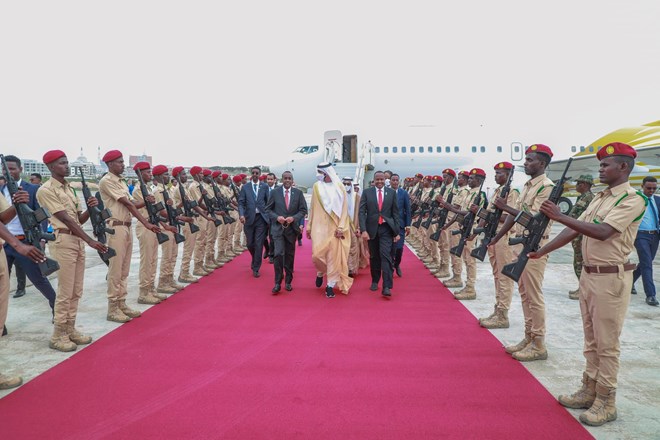
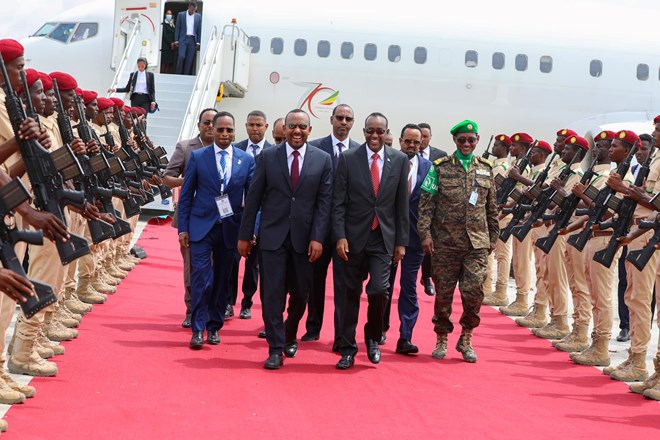
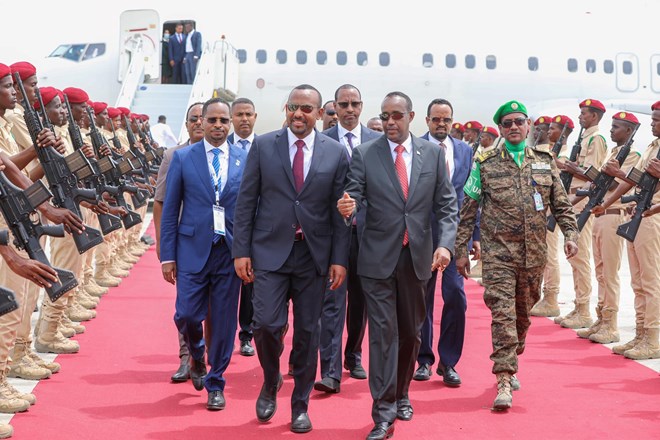
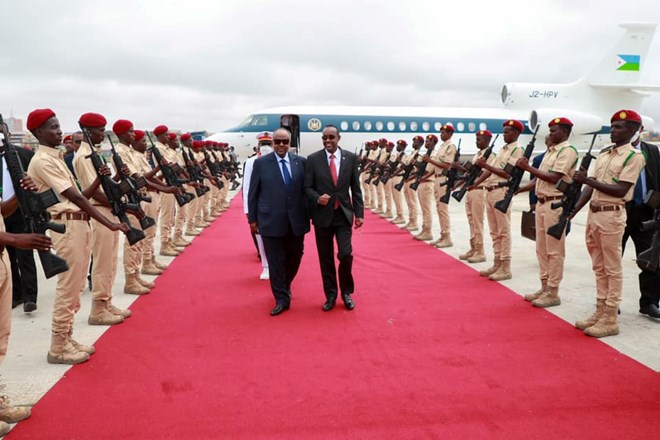
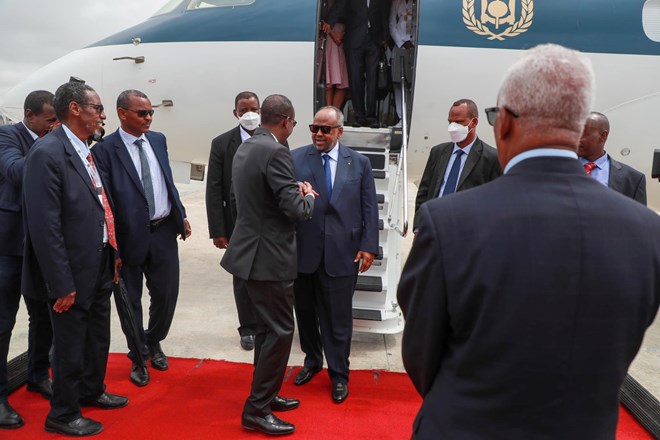
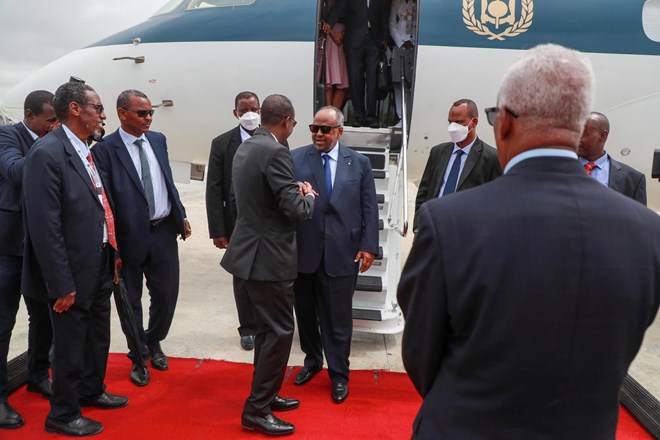
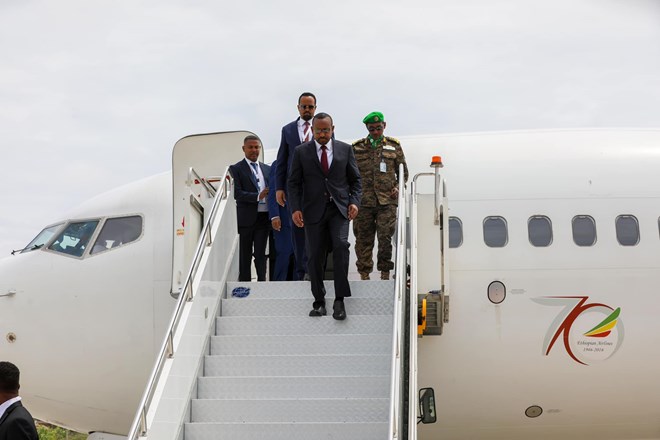
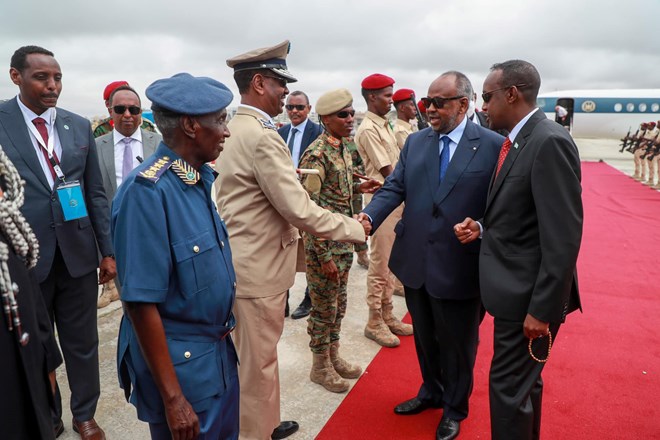
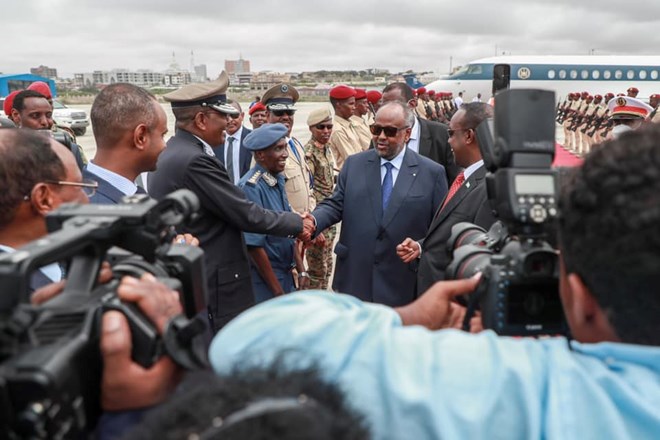
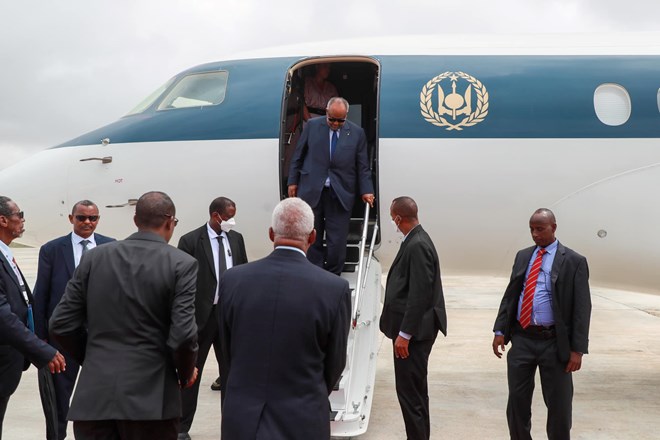
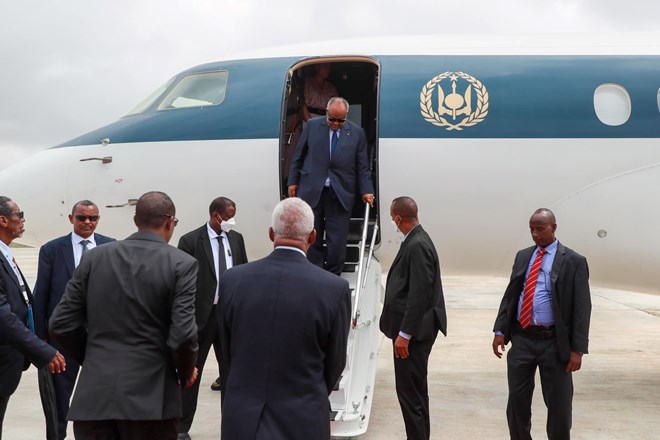
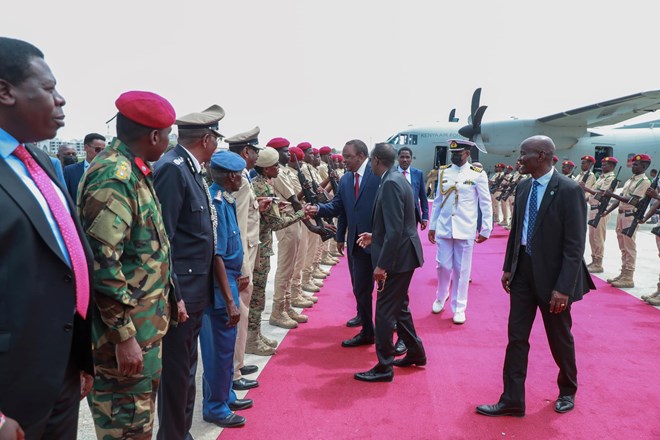
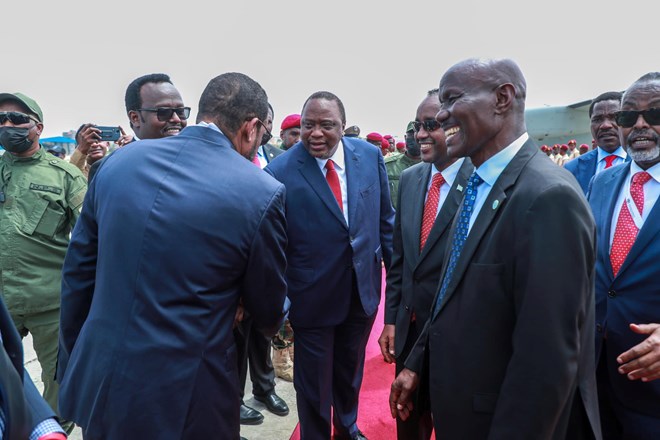
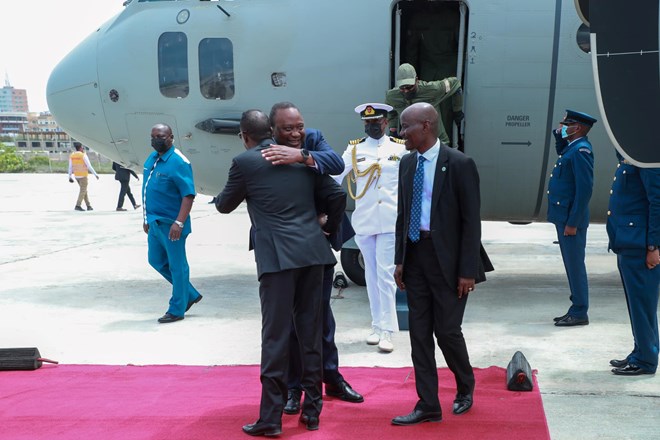
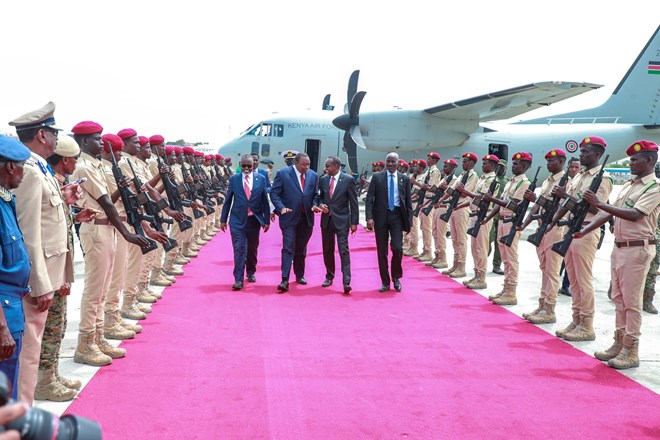

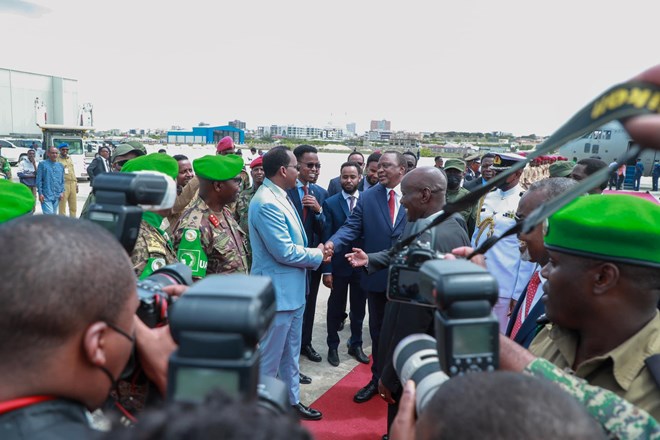

Mogadishu
Mogadishu (HOL) – Djibouti President Ismail Omar Guelleh, Kenyan President Uhuru Kenyatta, and Ethiopian Prime Minister Abiy Ahmed arrived in Mogadishu on Thursday to join delegates from 20 countries for Somali President Hassan Sheikh Mohamud’s inauguration ceremony.
advertisementsPrime Minister Mohamed Hussein Roble warmly welcomed the presidents, Prime Minister Abiy Ahmed, and other dignitaries at Mogadishu’s international airport. Today’s ceremony will take place at the Afisiyoni tent inside the airport, amid Somali police imposed a complete curfew in Mogadishu, covering both vehicle and pedestrian traffic until Thursday at 5:00 AM.
Egyptian Prime Minister Mostafa Madbouly and UAE State Minister for Foreign Affairs Sheikh Shakhboot Bin Nahyan Al Nahyan arrived early.
Mohamud was voted out of power in 2017 but re-elected by Somalia’s parliament on 15 May in Mogadishu, defeating the outgoing president Mohamed Abdullahi Farmaajo in indirect elections.
Foreign dignitaries begin to arrive in Mogadishu ahead of presidential inauguration
Foreign dignitaries begin to arrive in Mogadishu ahead of presidential inauguration

Source: Hiiraan online, Tuesday June 7, 2022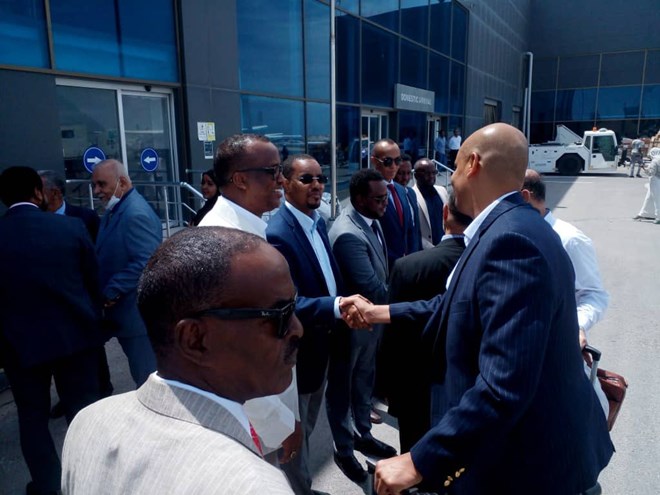
Mogadishu (HOL) – Diplomats and foreign dignitaries have begun to arrive at Aden Adde International Airport in Mogadishu on Tuesday ahead of Hassan Sheikh Mohamud’s presidential inauguration later this week.
advertisementsSo far, representatives from Djibouti, Ethiopia, Kenya, Uganda, Turkey and Bahrain have already landed in Somalia’s capital.
A delegation of Somali ministers was present at the airport to receive the guests.
HOL has learned that Kenyan President Uhuru Kenyatta, Ethiopian Prime Minister Abiy Ahmed and Djibouti President Ismail Omar Geelle, are the world leaders who have been confirmed to be attending the presidential inauguration on Thursday.
President Mohamud has promised a more balanced attitude to foreign relations and campaigned on promises of “no retaliation,” in stark contrast to former President Farmajo’s aggressive approach has isolated Somalia from historical friends.
Eritrea and Qatar are expected to send a delegation.
The top brass of Somalia’s security sector held a meeting on Tuesday to address the security challenges for the inauguration ceremony. Omar Mohamud Mohamed (Omar Filish), the mayor of Mogadishu, chaired the meeting, which was attended by the Minister of Security of the Federal Government of Somalia, the Commander of the Somali Police Force, the Commanders of the General Police and Security along with station officers and Banadir District Commissioners.
Many of the main thoroughfares through Somalia’s capital have been sealed off this morning, as residents reported seeing a dramatic uptick in police and armoured vehicles in the street.
Some of the roads closed on Tuesday are Maka Almukarama, Military Hospital, KM4 roundabout, Zobe junction and October 21st Road.
Residents say that the roads are also closed to pedestrian foot traffic.
Hassan Sheikh Mohamud was elected Somalia’s President for the second time in a decade on May 15, defeating incumbent Mohamed Abdullahi Farmajo in a landslide during the final round of voting.
‘Explosion of child deaths’ imminent in Horn of Africa if world does not act immediately
‘Explosion of child deaths’ imminent in Horn of Africa if world does not act immediately

Source: UNICEF, Tuesday June 7, 2022
This is a summary of what was said by UNICEF’s Deputy Regional Director for Eastern and Southern Africa, Rania Dagash – to whom quoted text may be attributed – at today’s press briefing at the Palais des Nations in Geneva.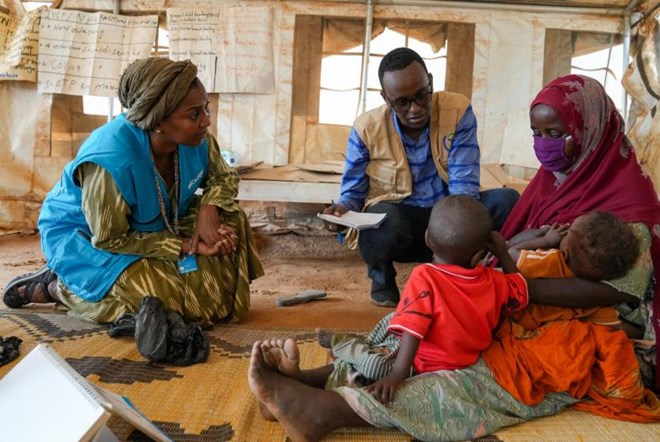
On 24 May 2022, Rania Dagash, UNICEF Deputy Regional Director for Eastern and Southern Africa, (left) meets with mother Ismayel and her twins (Libaan Osman Derow and Salman Osman Derow) at the integrated health center in Dollow, Somalia. The twins suffer from malnutrition. Ismayel feels lucky that she made it on time to bring her twins to health center for treatment.
GENEVA, 7 June 2022 – “I am here today to tell you plainly that, if the world does not widen its gaze from the war in Ukraine, and act immediately, an explosion of child deaths is about to happen in the Horn of Africa.
Severe Acute Malnutrition
“An estimated 386,000 children in Somalia are now in desperate need of treatment for life-threatening severe acute malnutrition – now exceeding the 340,000 children who required treatment at the time of the 2011 famine.
advertisements”The number of children facing this most deadly form of malnutrition has increased by more than 15 per cent in the space of five months.
“Across Ethiopia, Kenya and Somalia, more than 1.7 million children are in urgent need of treatment for severe acute malnutrition.
“Four rainy seasons have failed in the space of two years – killing crops and livestock and drying up water sources. Forecasts suggest the next October to December rains are likely to fail too.
“All three countries have recorded a significantly higher number of severely malnourished children admitted for treatment in the first quarter of 2022 compared to the first quarter of 2021:
- In Ethiopia, admissions were 27 per cent higher.
- In Somalia, admissions were 48 per cent higher.
- In Kenya, admissions were 71 per cent higher.
“Death rates are also concerning. This year, in some of the worst affected areas in the Horn of Africa, three times as many children have already died from severe acute malnutrition with medical complications in in-patient treatment centres compared to the whole of the previous year.
Water
“Between February and May, the number of households without reliable access to clean and safe water almost doubled – from 5.6 million to 10.5 million.
War in Ukraine
“The lives of children in the Horn of Africa are also at increased risk because of the war in Ukraine. Somalia alone used to import 92 per cent of its wheat from Russia and Ukraine – but supply lines are now blocked. The war is exacerbating spiralling global food and fuel prices, meaning many people in Ethiopia, Kenya and Somalia can no longer afford the basic foodstuffs they need to survive.
“These pressures are also impacting our response. The cost of the life-saving therapeutic food UNICEF uses to treat children with severe acute malnutrition is projected to rise by 16 per cent globally over the next six months, meaning UNICEF will require an estimated additional US$12 million more than expected in the Horn of Africa alone.
Funding
“UNICEF and other agencies have been repeatedly sounding the alarm bell on this crisis. We sincerely thank the donors who have made contributions – it is their support that has enabled us to respond the way we’ve been able to until now. But our appeal is still drastically underfunded – we have under a third of what we need this year.
“The international community – led by the G7 who will meet in Germany in June – needs to commit new, additional funding now to save lives. Focus on Ukraine cannot lead to neglect of other crises and ultimately more loss of life.
“We also want to see G7 leaders commit to acting early in future emergencies and investing in long term resilience work – like nutrition, water, education and cash transfer programmes. Somali children are living on the frontlines of the climate crisis now – this is not going away – we need to see significant step-change from the donor community to adequately support families to weather these cyclical climatic shocks.
“If I may, let me end by sharing the story of just two of those children facing the impending catastrophe I have outlined.
“I am just back from Somalia. At a health centre in the border town of Dollow I met Ismayel and her one-year-old twin boys – Salman and Libaan. She is pregnant but the devastating effects of the drought had forced her to walk 120km to get her sons treatment for malnutrition.
“Many children will not make it so far. I heard of children being buried along the roadside as their families make desperate, long treks to seek help.
“And we fear the worst is just around the corner.
“Thank you.”
